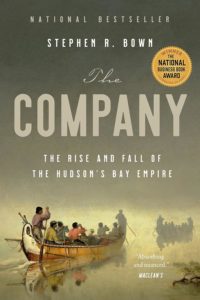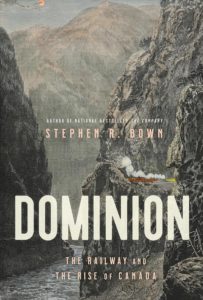Bestselling author decries ideological ‘history’
Canadians today “seem to have lost any sense of connection to our past.” So writes popular historian Stephen R. Bown in the C2C Journal. In an insightful article entitled Seeking the Ghosts that Keep us Alive, the author of The Company and Dominion argues that “our current national narrative holds that Canadian colonists were universally a bunch of despicable, racist thieves. They sought the extinction of Indigenous people and discriminated against other vulnerable populations whenever they could. And in the process our land was desecrated. It is a situation that can apparently only be remedied by completely repudiating our past.”
Bown argues that this new, self-loathing narrative, which deliberately ignores Canada’s most significant achievements, has led to “the wave of name changes, statue removals, museum purges, decolonization initiatives and assorted other historical refutations plaguing our country.” Too much history is being delivered not by serious authors writing books but “via opinion pieces in the media or reports from governments and various activist groups and organizations. The analysis is often simplistic, offers minimal context and makes little attempt at nuance or balance. Instead of striving to understand Canada’s past and the people who made it happen, these new narratives condemn, censure and erase, either from a fundamental ignorance of the difference between the past and our present, or in pursuit of ideological “presentism.”
Such arguments “fail as actual history, Bown writes, “because they lack a grounding in fact. Popular history has become largely “afactual.” As the author of a book about the Hudson’s Bay Company, Bown decries “the persistence of claims perpetrated by the CBC that the HBC deliberately distributed smallpox-infected blankets to Indigenous people. Such an allegation fits neatly into the current narrative that Canada actively sought to commit genocide against its native population. And the CBC does its part by claiming there are two sides of this debate to consider. But it is pure nonsense.”
Until the mid-19th century, Bown writes, “the HBC was as much a cultural institution as it was a business. HBC employees spoke Cree and other Indigenous languages and had deep social connections to the native community. They often married into Indigenous societies as a means of advancing commercial objectives; many children from these “country marriages” worked for the company in various capacities, as traders, hunters, labourers, translators and guides. Sometimes they ran their own enterprises transporting goods across the heart of the continent, using the HBC forts as wholesale distribution centres.
“No business deliberately murders its customers, employees or their families. And the HBC was no exception. There is simply no evidence to back up repeated CBC efforts to “investigate” the smallpox blanket claim. Giving the impression that the HBC was possibly engaged in such despicable behaviour is both disingenuous and libelous. A more serious approach would be to explain how the company often extended aid and credit to support Indigenous societies during epidemics; their survival was its survival, after all. It might also reveal that as early as the 1830s, the company offered primitive smallpox vaccines to all people within its trading regions.
“Another example of our current preoccupation with twisting facts through a misrepresentation of popular history is the widespread blame pinned upon Sir John A. Macdonald for the entirety of Canada’s Indian Residential Schools. Macdonald died in 1891, many years before these schools were massively expanded by Sir Wilfrid Laurier’s Liberal government in the early 20th century. We cannot know what Macdonald would have thought about this expansion, the later decision to make attendance compulsory (if only some of the time) or to place everyday operations in the hands of churches. This is because he had no role in it. He was dead, and the country was governed by a different prime minister from a different political party. Readers of popular history should know all this. Instead, the new purveyors of popular history insist it was all his fault. As a result, Macdonald’s name and likeness have been stripped from innumerable schools and public places.”
Bown has more to say along these lines. Check out his article at the link in the first paragraph.